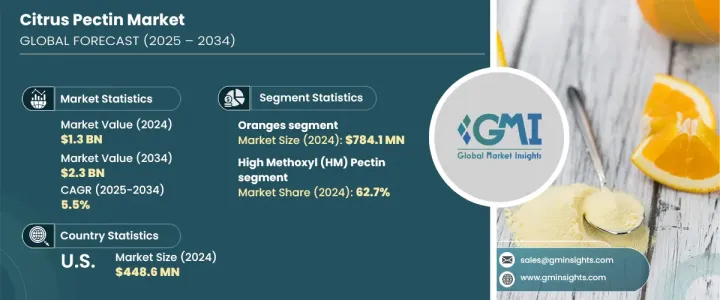
세계의 시트러스 펙틴 시장은 2024년에 13억 달러로 평가되었고, 2025-2034년 연평균 복합 성장률(CAGR) 5.5%로 견조한 성장이 예상되고 있습니다.
이 성장의 주요 요인은 시트러스 펙틴의 건강상 이점을 둘러싼 소비자 의식 증가입니다. 시트러스 펙틴은 특히 오렌지, 레몬, 자몽과 같은 감귤류에서 추출한 경우 천연 겔화 및 증점 특성을 발휘하기 위해 다이어트와 영양 보급 용도로 인기를 얻고 있습니다. 시트러스 펙틴은 클린 라벨의 비유전자 재조합 원료를 식품에 요구하는 사람들에게 이상적인 솔루션입니다.

보다 건강하고 식물 유래의 지속 가능한 선택을 추구하는 사람들이 증가함에 따라 시트러스 펙틴 수요는 증가의 길을 따릅니다. 식음료 제조업체는 식감, 안정성, 일관성을 향상시키고 깨끗하고 자연스러운 원료를 요구하는 소비자의 기호의 고조에 대응할 수 있는 이 만능 원료에 점점 주목하고 있습니다. 게다가, 보다 건강한 식품 옵션에 대한 수요가 계속 확대되고 있는 가운데, 잼과 젤리부터 음식에 이르기까지 시트러스 펙틴의 광범위한 용도는 현대 식품 산업에 필수적입니다.
| 시장 범위 | |
|---|---|
| 시작 연도 | 2024년 |
| 예측 연도 | 2025-2034년 |
| 시작 금액 | 13억 달러 |
| 예측 금액 | 23억 달러 |
| CAGR | 5.5% |
공급원별로 시장은 오렌지, 레몬, 자몽 등으로 구분되며, 오렌지 부문은 시장을 선도하여 2024년에는 7억 8,410만 달러를 창출했습니다. 오렌지 유래의 펙틴은 식감과 점성을 높이는 뛰어난 능력으로 음식 식품 업계에서 특히 선호되고 있습니다. 이 분야는 또한 건강 지향 소비자의 선호를 따르는 비유전자 재조합 식물 유래 원료를 추구하는 경향 증가에 의해 뒷받침됩니다. 클린 라벨 운동이 기세를 늘리고 있는 가운데, 오렌지 유래 펙틴의 매력은 더욱 두드러지고 있습니다.
감귤류 펙틴 시장은 등급으로 나누어지며, 고메톡실(HM) 펙틴과 저메톡실(LM) 펙틴이 2대 범주입니다. HM 펙틴은 뛰어난 겔화 특성을 가지고 있으며, 특히 잼이나 젤리 등 다양한 식품의 제조에 빠뜨릴 수 없기 때문에 2024년에는 62.7%로 압도적인 점유율을 차지하고 있습니다. HM 펙틴은 높은 설탕과 낮은 pH 수준의 존재 하에서 견고한 겔을 형성하는 능력이 있기 때문에 원하는 식감과 일관성을 실현하기에 적합한 옵션이 되어 시장 성장을 이끌고 있습니다.
미국에서 시트러스 펙틴 시장은 2024년에 4억 4,860만 달러를 창출했습니다. 이 성장은 깨끗한 라벨과 천연 식품 재료에 대한 선호도 증가로 인한 것입니다. 시트러스 펙틴은 감귤류의 과피에서 유래하는 식물 유래 제품이기 때문에 이러한 소비자 수요에 훌륭하게 부합하고 있으며, 다양한 식음료의 용도에 있어서 식감, 안정성, 일관성 향상 등의 기능적 이점을 제공합니다.
시장이 진화를 계속하고 있는 가운데, 건강 지향, 지속가능성, 식물 유래 식품에 대한 주목의 고조에 따라, 시트러스 펙틴이 식음료 업계에 있어서 중요한 성분으로 지속되는 것은 확실할 것입니다.
The Global Citrus Pectin Market, valued at USD 1.3 billion in 2024, is expected to grow at a robust CAGR of 5.5% from 2025 to 2034. This growth is primarily driven by the increasing consumer awareness surrounding the health benefits of citrus pectin. Known for its role in dietary and nutritional applications, citrus pectin has gained popularity due to its natural gelling and thickening properties, especially when extracted from citrus fruits like oranges, lemons, and grapefruits. It is an ideal solution for those seeking clean-label, non-GMO ingredients in their food products.

As more people gravitate towards healthier, plant-based, and sustainable options, the demand for citrus pectin continues to rise. Food and beverage manufacturers are increasingly turning to this versatile ingredient for its ability to enhance texture, stability, and consistency, meeting the growing consumer preference for clean, natural ingredients. Moreover, as the demand for healthier food options continues to expand, citrus pectin's wide range of applications, from jams and jellies to beverages, makes it an essential part of the modern food industry.
| Market Scope | |
|---|---|
| Start Year | 2024 |
| Forecast Year | 2025-2034 |
| Start Value | $1.3 Billion |
| Forecast Value | $2.3 Billion |
| CAGR | 5.5% |
By source, the market is segmented into oranges, lemons, grapefruits, and others, with the oranges segment leading the market, generating USD 784.1 million in 2024. Pectin derived from oranges is particularly favored in the food and beverage industry due to its exceptional ability to enhance texture and consistency. This segment is also boosted by the growing trend for non-GMO, plant-based ingredients that align with health-conscious consumer preferences. As the clean-label movement continues to gain momentum, the appeal of orange-derived pectin becomes even more pronounced.
The citrus pectin market is also divided by grade, with High Methoxyl (HM) Pectin and Low Methoxyl (LM) Pectin being the two primary categories. The HM Pectin segment held a dominant share of 62.7% in 2024, owing to its superior gelling properties, which are crucial for producing various food products, particularly jams and jellies. HM Pectin's ability to form robust gels in the presence of high sugar content and low pH levels makes it the preferred choice for achieving the desired texture and consistency, driving its growth in the market.
In the U.S., the citrus pectin market generated USD 448.6 million in 2024. This growth is largely attributed to the increasing preference for clean-label and natural food ingredients. As a plant-based product derived from citrus fruit peels, citrus pectin aligns perfectly with this consumer demand, offering functional benefits such as improved texture, stability, and consistency in a range of food and beverage applications.
As the market continues to evolve, the increasing focus on health-conscious, sustainable, and plant-based food products will ensure that citrus pectin remains a key ingredient in the food and beverage industry.